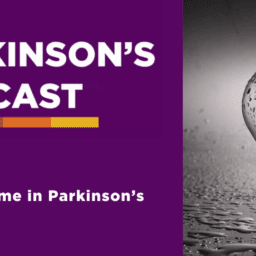When you take Parkinson's medications regularly and your symptoms re-appear or worsen, you are experiencing an OFF time. That seems to be a simple enough definition of OFF; however, it’s anything but simple. And when you feel OFF, it's anything but pleasant. Nearly 35% of people with Parkinson’s experience OFF times (and this percentage increases with age), and OFF times can negatively impact quality of life in a myriad of ways. But there are ways to reduce OFF times. During this webinar, Dr. Yasar Torres-Yaghi and Lauren Costantini discussed what it means to be OFF, the different types of OFF times, how to communicate about OFF, ways to treat OFF, and more.
Watch the recording below.
To download the audio, click here.
To download the transcript, click here.
Show Notes
- In clinical terms, OFF time is the return of your Parkinson's symptoms because your medication either hasn’t fully kicked in, has worn off, and/or isn't properly working due to confounding factors such as protein intake
- OFF periods can affect your movement as well as your physical and mental functioning, causing a return of symptoms including pain, “brain fog,” panic, anxiety, sweating, depression, and more
- While the gold standard of medication to treat Parkinson's symptoms is carbidopa/levodopa, adjunctive therapy (the use of multiple medications) may be used to reduce OFF time
- Medication categories and formulations mentioned in this webinar that can help with OFF times include:
- MAO-B inhibitors (such as Elderpryl, Azilect, and Xadago)
- Dopamine agonists (different formulations of dopamine agonists include Mirapex, Requip, Kynmobi, Apokyn, and the Neupro patch)
- Other formulations of carbidopa/levodopa (such as an extended release carbidopa/levodopa medication like Rytary)
- COMT inhibitors – (used to prolong the effect of carbidopa/levodopa; medication names include Comtan, Stalevo, Tasmar, Opicapone)
- Derivatives of amantadine – (used to help with wearing OFF and dyskinesias; the amantadine extended release medication GOCOVRI is the only medication FDA-approved to treat both OFF and dyskinesia. Osmolex ER is another extended-release amantadine medication that may help with OFF times)
- A2A receptor antagonists (such as the medication NOURIANZ)
- Proper nutrition, hydration, and exercise may all have an impact on your OFF periods. Drinking plenty of water, following a Mediterranean diet, and exercising may be good places to start. (These lifestyle choices may, at the very least, reduce constipation, therefore allowing a better absorption of your medication. This, in turn, can help you feel ON more often)
- OFF times do often increase as Parkinson's progresses. Often, this is not because your medication begins working differently, but rather because the cells in the brain that are responsible for the uptake of carbidopa/levodopa are no longer functioning properly
- Medications and treatments available to treat OFF are constantly developing, so it is important to continue to talk to your doctor about new options if your OFF times are not being treated
- Surgical treatments that may help reduce OFF times include a medication infusion port (Duopa) or deep brain stimulation (DBS)
- Certain "on-demand" therapeutics exist that may be an option when you need to attend to OFF symptoms in the moment. Talk to your physician about these possible options:
- Taking an extra dose of carbidopa/levodopa
- A rotigotine transdermal system
- Injectable apomorphine (such as Apokyn)
- Inhaled option (such as Inbrija)
- Sublingual apomorphine (such as Kynmobi)
Additional Resources
The Science of Parkinson's OFF
How to Take Levodopa for Parkinson’s
Living with Parkinson’s: What Is OFF?
Results of Our OFF Survey & Stories
How to Communicate What It Means to be OFF
[Video] Parkinson’s Medication Management for Motor Symptoms with Dr. Aaron Haug
Live Well Today Webinar Series Presenting Partners*
 *While the generous support of our sponsors makes our educational programs available, their donations do not influence Davis Phinney Foundation content, perspective, or speaker selection.
*While the generous support of our sponsors makes our educational programs available, their donations do not influence Davis Phinney Foundation content, perspective, or speaker selection.

















